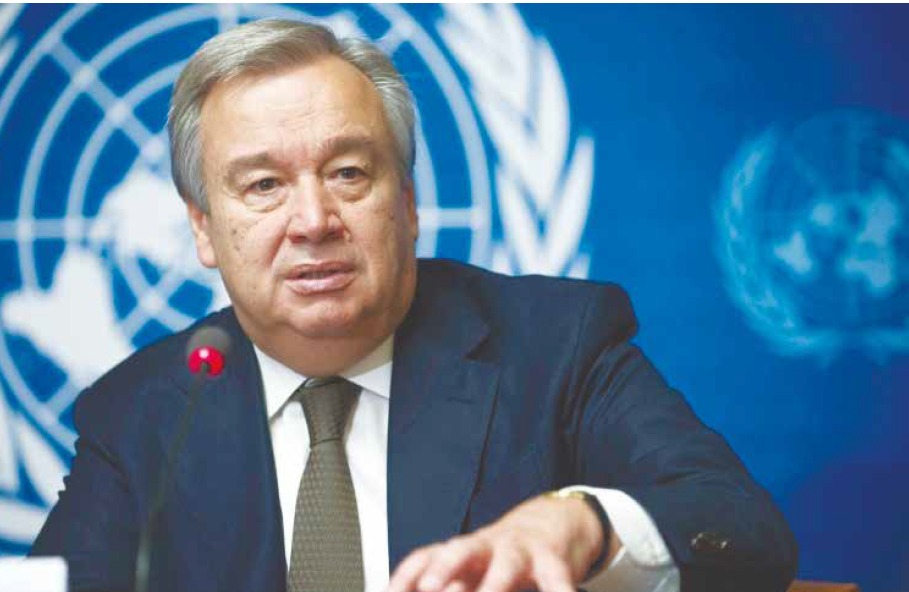World News19.09.2022
Guterres: ‘Global addiction to fossil fuels’ must end and a ‘renewables revolution’ jumpstarted

QAZAQ GREEN. Achieving a just and equitable energy transition is “one of the biggest challenges facing our world,” UN Secretary-General António Guterres told the Global Compact Board meeting on Sunday, UN News reports.
Climate disasters and skyrocketing fuel prices have made the need to “end our global addiction to fossil fuels” crystal clear, he said, underscoring the importance of investing in renewables, building resilience, and scaling up adaptation.
“Had we invested massively in renewable energy in the past, we would not be in the middle of a climate emergency now”.
Renewals: ‘Only credible path’
Renewables are “the only credible path” to real energy security, stable power prices and sustainable employment opportunities, said the UN chief.
He also maintained that the share of renewables in global electricity generation must increase from nearly 30 per cent today to over 60 per cent in 2030 and 90 per cent in 2050.
“Leaders in business as well as government must stop thinking about renewables as a distant project of the future”, underscored the top UN official.
“Without renewables, there can be no future”.
Key energy priorities
The Secretary-General went on to outline his Five-Point Energy Plan to shift to renewables, beginning with treating the technologies as freely available “global public goods”.
“Identifying patents that can be made freely available – especially those relating to battery and storage capacity – are crucial for a rapid and fair energy transition,” he said.
Next, he highlighted the need to secure, increase, and diversify supply chains for renewable energy technologies, pointing out that supply chains for components and raw materials are "still concentrated in a handful of countries”.
Third, was to level the playing field for renewables.
“We have the technology, capacity, and funds,” said the UN chief, “but we urgently need to put policies and frameworks in place to incentivize investments and eliminate bottlenecks caused by red tape, permits and grid connections”.
Shift subsidies from fossil fuels to renewable energy was his fourth point, as he noted that each year, governments spend around half a trillion dollars to artificially lower the price of fossil fuels – “more than triple what renewables receive”.
“If we channel these resources and subsidies to renewables, we not only cut emissions; we also create more decent and green jobs,” he argued.
Financing the future
Mr. Guterres’ fifth and final point focused on the importance of tripling public and private investments in renewables to at least $4 trillion dollars a year.
“Upfront costs for solar and wind power account for 80 per cent of lifetime costs – meaning big investments today will reap even bigger rewards tomorrow,” he said.
However, this requires: financing to flow to those who need it most; adjusted risk frameworks and more flexibility to scale up renewable finance; and lowering financing costs for developing countries.
“The cost of capital for renewable energy projects in the developing world can be seven times higher than in the developed world,” flagged the UN chief, flagging that Africa attracts a mere two per cent of clean energy investments despite its vast renewable energy potential.
Walking the talk
According to Mr. Guterres, a just transition to a renewable energy future is everybody’s business, including the private sector to advance science-based targets and Just Transition plans, in partnership with labour organizations and civil society.
“Lip service won’t do. We need credible actions and accountability,” he underscored.
Every business and investor; every city and country must “walk the talk” on their net-zero promises to realize the Paris Agreement and rescue the Sustainable Development Goals, added the UN chief.
“The UN Global Compact is poised to help in this vital effort,” he spelled out, urging everyone to accelerate action across industries and regions “to jumpstart the renewables revolution”.
Advanced 'high-density waterless hydro' energy plant gets green light
Eurostar aims to have all their trains powered by renewable energy by 2030
‘World’s first’ wooden wind turbine blades installed in Germany
Natron to kick off mass-production of long-life sodium-ion batteries
Tajikistan intends to fully switch to renewable energy sources by 2032 - deputy PM
Floating solar can power Africa’s energy goals, study finds
South Korean сompanies to modernize Kazakhstan's power plants, and GRES Topar
Decarbonization and sustainable development to take center stage at the 11th Annual Downstream Central Asia & Caspian Conference
Renewable electricity share in Turkey nears 50%
Sinn Power plans groundbreaking floating photovoltaic system in Bavaria
Swiss researchers boost efficiency of vertical axis wind turbines
Rapid expansion of batteries will be crucial to meet climate and energy security goals set at COP28
Georgia acquires first floating solar power plant
Wind turbine blades get a sustainable upgrade
China restricts offshore solar PV projects to specific sea areas
Biden announces $7 billion for solar energy in low-income communities
Production of a solar energy storage battery has started in Vilnius
Ainur Sospanova: Clear rules are needed for functioning of bilateral contracts market
Process to submit applications for RES auctions to construct HPPs and WPPs has commenced in Kazakhstan
JinkoSolar recognized as a Tier 1 Energy Storage Provider by BNEF












